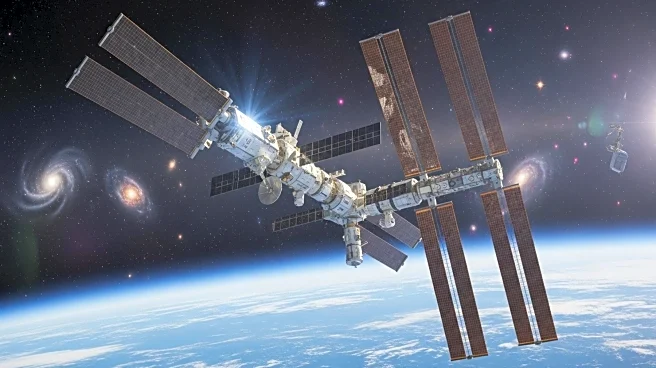What is the story about?
What's Happening?
NASA's International Space Station (ISS) marks 25 years of continuous human habitation in space, a milestone that underscores its role as a global orbiting outpost. Since the arrival of Expedition 1 on November 2, 2000, the ISS has been a constant presence 250 miles above Earth, hosting astronauts and cosmonauts from 26 countries. The station, a collaborative effort primarily between NASA and the Russian Space Agency, has also welcomed space tourists and private industry astronauts. As the ISS approaches the end of its operational life, NASA is planning its retirement, with SpaceX contracted to safely deorbit the station post-2030. The ISS has been a hub for various spacecraft, including Russia's Soyuz, SpaceX Dragon, and others, and has facilitated significant scientific research and international cooperation.
Why It's Important?
The ISS has been pivotal in advancing human space exploration and international collaboration. Its continuous operation has provided invaluable data on long-term space habitation, crucial for future missions to the Moon and Mars. The station's retirement marks a shift towards commercial space stations, with companies like Axiom, VAST, and Voyager developing their own platforms. This transition could stimulate a new era of space exploration and commercialization, potentially lowering costs and increasing access to space. The ISS's legacy will influence future space policy and industry, as NASA reallocates resources to lunar and Martian exploration, while private entities take on roles in low Earth orbit.
What's Next?
As NASA prepares for the ISS's retirement, it is fostering the development of commercial space stations. Axiom Space, for instance, is working on modules that will initially attach to the ISS before becoming independent. Other companies like Voyager and VAST are also planning their own stations, which could support both private and government missions. This shift is part of NASA's strategy to focus on deep space exploration, including the Artemis program aimed at returning humans to the Moon. The transition to commercial stations is expected to maintain a human presence in low Earth orbit, ensuring continued research and development in space.
Beyond the Headlines
The move towards commercial space stations raises questions about the future of international cooperation in space. While private companies may drive innovation and reduce costs, the geopolitical dynamics of space exploration could shift. The involvement of multiple nations in the ISS has been a model of peaceful collaboration, and it remains to be seen how this will evolve with the rise of commercial entities. Additionally, the commercialization of space could lead to ethical and regulatory challenges, particularly concerning space tourism and the management of orbital debris.

















